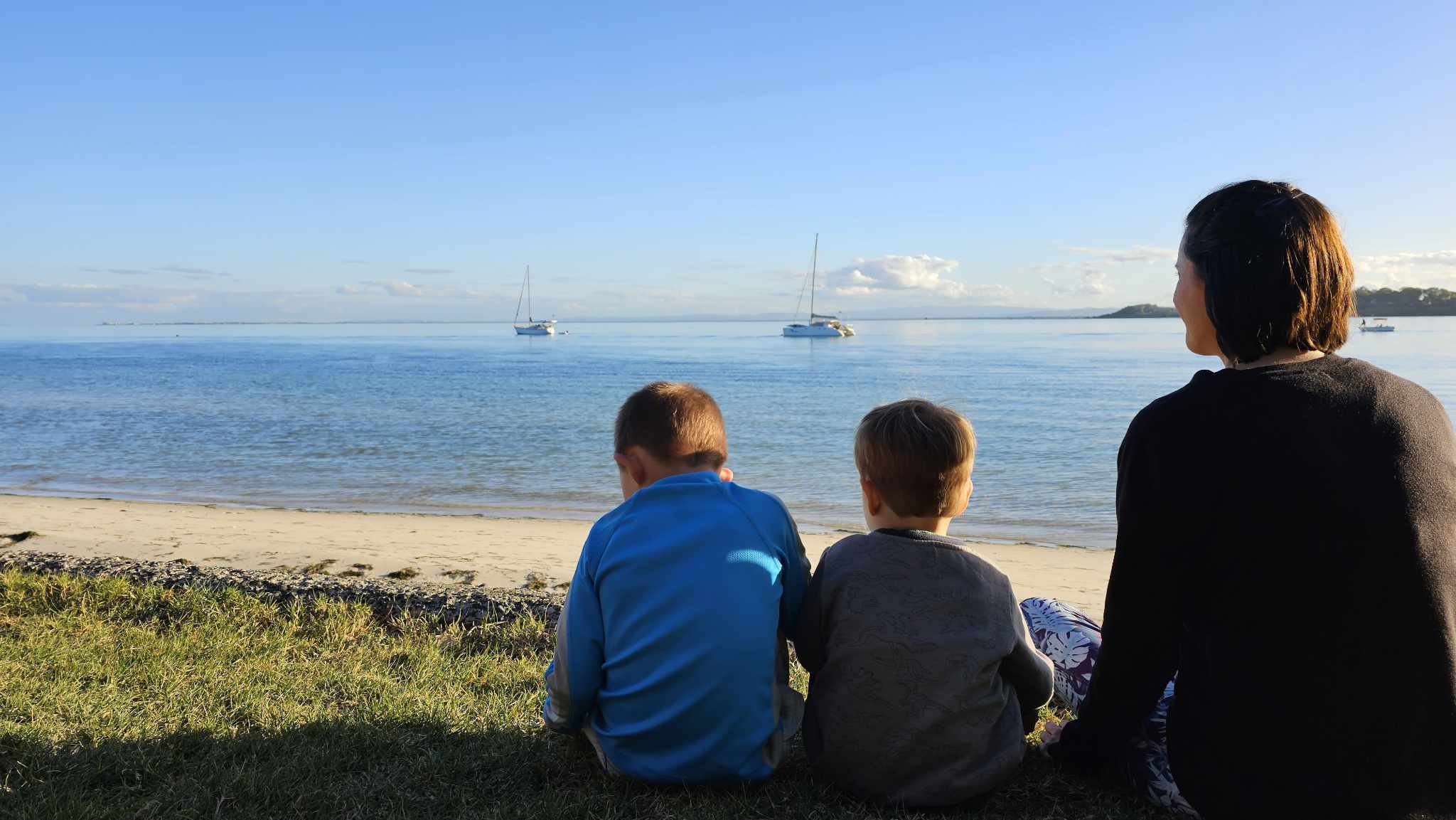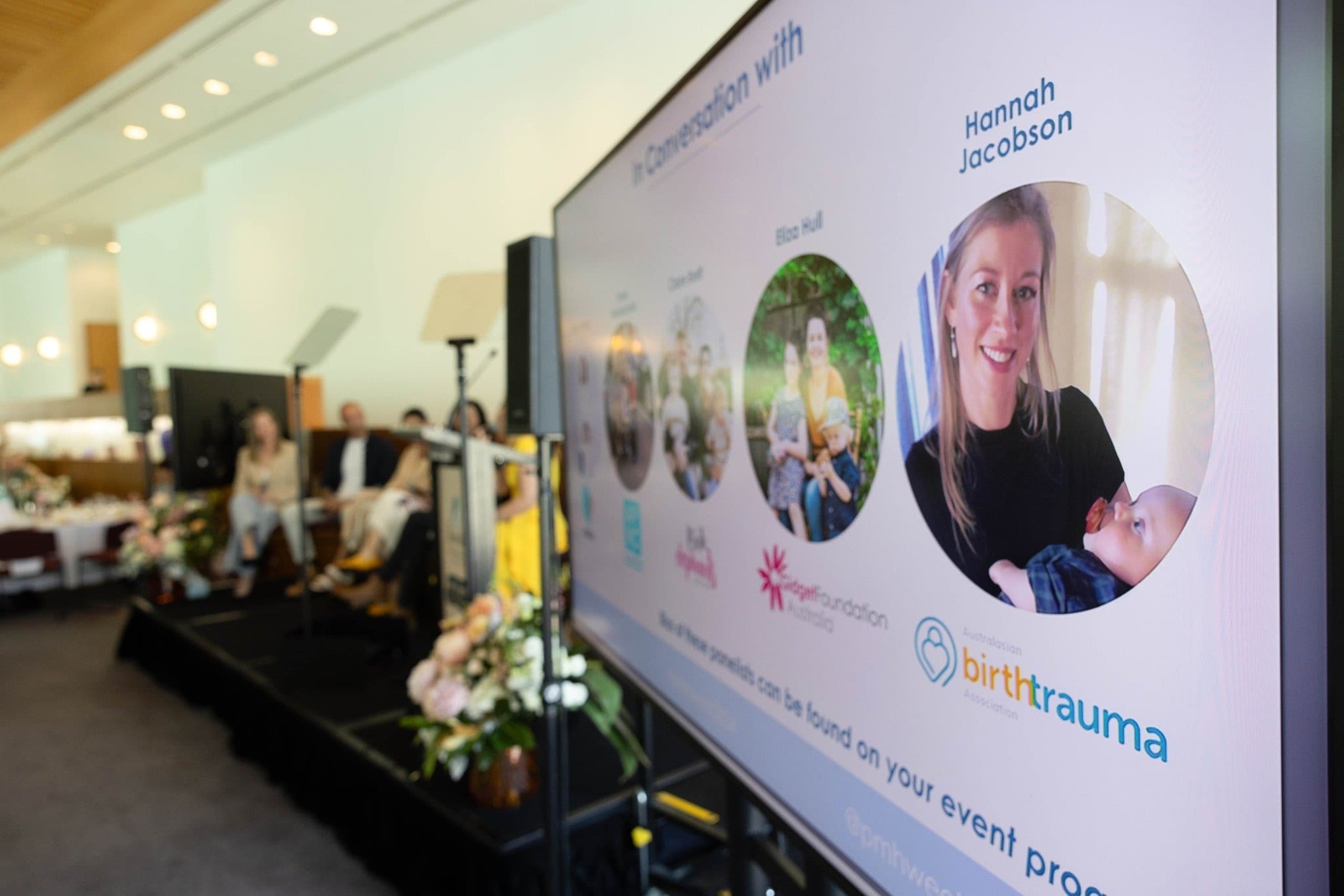It is five and a half years since my daughter was born. Unlike some women who had traumatic first births, I went on to have two more children. From a medical perspective, all three births were considered to be successful vaginal deliveries. I am fortunate that I went on to have the two sons that I birthed with minimal intervention. However I seem unable to put the events of my daughter’s birth behind me. I have continued to seek out other women’s birth stories. I hoped that by absorbing them I would improve the sense of perspective I had on my own first experience.
Like many other expectant mothers I had aspired to the empowerment of natural childbirth. I had learned about the dangers and disappointment that tracked the spiralling cycle of medical intervention. I learned about breathing through the pain. I practiced the various positions I later used to maintain my active involvement in the birth. My husband was a committed and supportive birth partner. I felt ready.
Unfortunately, my first labour was long. Twenty two hours of contractions began in the evening and was followed by a three hour long third stage. I had tried getting into the birthing pool but it only slowed things down. I repeatedly told the midwives that I was worried about being unable to urinate. Nobody seemed to be concerned. I remember the obstetrician coming in to the room after two hours of pushing and warning the midwives that intervention would be required after three. When she returned the whirlwind began.
I was exhausted and failing. I was told that forceps were required. This did not align with my birth plan which requested ventouse over forceps. My mother had suffered pelvic organ prolapse following forceps delivery and I wanted to avoid the same fate. But I was told there were no other options. I could barely speak. They said we had run out of time. I do not remember consenting. There was no mention of the high risk factors associated with obstetric forceps in women of my age (then 32). I still had a full bladder, which I think may have been a risk factor for obstructing the delivery. I had received no pain relief.
I was positioned on my back with my legs in stirrups. I felt the separated halves of the cold metal forceps being inserted. This hurt but was bearable. Then as they were connected the feel of forceful grinding metal inside my pelvis made me freeze with fear. I was told to relax and wait for the next contraction. When it came, I dutifully gave everything I had left to that last push. But I had no idea what was in store. On top of the overwhelming wave of the contraction, I felt the metal inside me being rotated. It tore through me with a level of pain that I cannot describe. A guttural scream came out of me. No one in the room seemed to realise that this was not the proud cry of a natural birthing mother but rather a despairing plea for mercy from unfathomable pain. Months later I found out that the forceps had ripped my pelvic floor muscles away from their attachment to my pelvic bones on both sides of my body. This was termed a bilateral levator avulsion. The forceps also crashed into my tailbone (coccyx) and snapped it off. It is still dangling freely inside my pelvis.
My daughter was delivered. Everyone seemed to disappear to focus on the baby. She was briefly returned to me for my skin to skin moment then whisked away again to review some breathing issues that later turned out to be minor. The doctors returned to me because I was haemorrhaging. The process was completed with me being taken into surgery because the placenta hadn’t delivered. I opted for the general anaesthetic to make it end.
While recovering in hospital for five days, no one assessed the damage done by the forceps. I was told I had been unlucky and had some bad bruising. I was given ice packs and opiate pain relief. There was no mention of the possible complications to my health or recovery that are so common after a forceps delivery. I was lead to believe that I had achieved a relatively successful normal birth and that my body just needed time to recover. It was only when I swapped birth stories within my mother’s group that I realised my recovery was far from normal.
It had taken weeks before I could be upright for more than a few minutes. When my recovery eventually stabilised my body still did not feel right. Specialist ultrasound later revealed that I had sustained permanent damage. Because my pelvic floor muscles were no longer attached, they were unable to hold my pelvic organs in place. I had a three compartment prolapse and rectocele. I had difficulty with bowel movements. I was one of the lucky ones because I had no significant incontinence, but every time I went to the toilet I thought about the moment the forceps were rotated inside me. There was a constant dragging feeling in my pelvis. I could not run or do high impact exercise because it made the dragging feel worse, like it was damaging me further. I felt like I had been crippled. I did extensive pelvic floor exercises and physio but because the muscles were detached, there was almost no perceivable improvement. My experience gave rise to questions that I still have no answers to. Given the significant impact on my quality of life why had no one discussed the risks with me before the procedure? Why were there no checks on the damage after it? Why was I sent home unprepared for the fear and confusion that plagued me as my expectations of a full recovery failed to materialise?
Five and a half years later, I have finally had an operation to improve my pelvic floor. I found access to a leading specialist who uses ultrasound to accurately assess the anatomical issues involved in prolapse. I was advised that the specificities of my condition meant the standard treatment of and anterior and posterior repair would have an 80 to 90% chance of failure within 10 years. I decided to be part of a clinical trial to test a permacol sling (not a mesh) that would support my pelvic floor muscles and hopefully provide a long term improvement. In addition to the sling, I had an anterior repair, a posterior repair and a hysteropexy (raising the uterus with stitches to the sacrospinous ligament). The surgery lasted five and a half hours and is expected to take six weeks to recover from.
I consider myself very fortunate for a number of reasons. My children were all safely delivered and healthy. I found an experienced specialist surgeon able to comprehensively assess my condition and recommend appropriate options. The repair surgery was a success.
However, what lingers is my difficulty in putting this all behind me. I am not usually the type to dwell on events from my past. However, for the last five years I have had periodic flashbacks. I see the gynaecologist’s face. I hear her instructions. I feel powerless and overwhelmed. I feel the grind of metal as the forceps were joined. And I relive the gut wrenching pain as they were rotated. I have woken in tears in the middle of the night. I have driven myself into hysteria because the memories will not leave my head as I try to go to sleep. I have avoided writing this down or even talking about it partly because I wanted to move on and partly because it was so distressing to go over. I thought that focusing on my work, my children, my marriage and my future would distract me for long enough that distance would allow me to get over this. Yet I am finding that my slow recovery from the extensive repair surgery serves as a damning confirmation of the magnitude of the original damage. And I am haunted again. I hope that writing these words will bring me some peace.
*please note, we are unable to provide the name of the surgeon that worked with Sarah. You can search for a Urogynaecology subspecialist here*











16 Responses
Hi there,
So sorry to hear about what happened to you – I’m 5 months pp and apart from getting ventpuse instead of forceps my story is identical to yours. I am looking for a surgeon who can repair pelvic floor – can you please let me know the name of your surgeon?
I really appreciate it.
Thanks
Hi There
Please email me amy@birthtrauma.org.au and I’ll be happy to help
Thank you for being brave enough to share that story. The extent of what happened to you sounds completely unfair and unnecessarily damaging.
I hope your story and those we hear from so many other women improve the birthing process. Well done for taking a first step!
Hi Sarah
Thankyou so much for sharing your story. I’m 6 weeks postpartum and Had a similarly traumatic experience resulting in prolapse at a couple of weeks postpartum. I’d never even heard of this condition and I can’t believe This can happen without fully informed consent. Your story has given me hope that there is a light at the end of the tunnel and I would be so grateful if you could share the details of your surgeon. I hope you continue to be recovering well.
Naomi
I’m so sorry to read this Sarah. I had a very similar birth experience 6 weeks ago resulting in injury and I have the same questions. I hope you are continuing to recover and heal.
Naomi
Hi Sarah.
Your birth journey sounds very similar to my own. I wish I was advised of prolapse and was better prepared for what to expect and how to best recover. I would love a bit more information on your surgery if I could touch base somehow? Hope everything is going well for you.
I’m so sorry for your experience Sarah. While I didn’t experience physical intervention During my two births, I did end up with pelvic floor trauma and an avulsion of the muscles. I only found out because I wanted to go running and went to see a women’s Physio 7 weeks post birth. I’d been to see my OB the week before. He didn’t mention a thing. All he checked for was that my cervix was closed. I will likely never be able to run again. I have incontinence when I do activities I would love to do with my kids when I’m older, and can’t do many exercises at the gym I used to be able to do. I am still so mad with my OB that he didn’t assess my pelvic floor muscles. How many women would never go to get checked after their 6 week check up. Surely they have a duty of care to their patients??!!!!!!!
I know what you mean Tracy. At my six week check, my OB only said: “oh, it appears you have rectocele, just go and see a physio”… I actually had levator avulsion along with both anterior and posterior prolapse. It took a while before I could see a physio. I didn’t even know the extent of what I had and had no idea that I had to be careful lifting etc.
I wish I would have been explained the risks and could have made an informed decision for the birth.. but it’s too late now.
I feel like this is my life and that, because of the lack of professionalism, it has been wrecked. I am so angry with the world right now. Completely gutted 🙁
Sarah, thank you So very much for sharing your experience. I feel for you and can empathize. I am nearly 2yrs pp and it has taken this time to uncover the full extent of my injuries regarding a similar birth story and only now am I beginning to receive the correct treatment advice.
One of the most difficult things for me to understand, is how easily women In this situation can be dismissed by the medical industry and society in general, even though we are confronted by significant and life changing injuries. Managing pain and the debilitating injuries on a daily basis is beyond anything I ever imagined would result from becoming a mother. The lack of support and education around this topic for mother’s and their families, is detrimental to so many women and our communities at large.
The more we use our voices and share our stories, hopefully the more support will be generated all round.
I wish you Sarah and all of you who have experienced something similar, that you will all be heard, treated with kindness and respect in order to make a healthy recovery xx
Sarah, thank you So very much for sharing your experience. I feel for you and can empathize. I am nearly 2yrs pp and it has taken this time to uncover the full extent of my injuries regarding a similar birth story and only now am I beginning to receive the correct treatment advice.
One of the most difficult things for me to understand, is how easily women In this situation can be dismissed by the medical industry and society in general, even though we are confronted by significant and life changing injuries. Managing pain and the debilitating injuries on a daily basis is beyond anything I ever imagined would result from becoming a mother. The lack of support and education around this topic for mother’s and their families, is detrimental to so many women and our communities at large.
The more we use our voices and share our stories, hopefully the more support will be generated all round.
I wish you Sarah and all of you who have experienced something similar, that you will all be heard, treated with kindness and respect in order to make a healthy recovery xx
Hi Sarah,
I am currently grieving from the SAME EXACT THING…. I just gave birth 3 months ago and am 42yo. Unbeknown to me, Levator Avulsion appear to be fairly common and has a rate of %50 in women over 40yo AND for traumatic birth. I am pretty angry that no-one at all ever mentioned the risks for me… I did bring up ‘c-section’ but all I could hear was that ‘natural birth’ was better for baby. One of the pre-natal class I paid for painted such a nice picture of birthing that I actually thought I’d sneeze through it. I unfortunately pushed for 3 hours before they said they’d use forceps. They said that the baby was too far in to use ventouse and said that forceps are better than c-section (!!!!! you have to be kidding).
I am now stuck with a body I can no longer use… I used to be so active and so fit (running, MTB, snowboarding..) and now only just standing for too long makes my inside coming out of my vagina. I can literally see the bulge and also have to push my finger inside my vagina when I open my bowels or else it doesn’t empty well (I also have both anterior and posterior prolapse along with levator avulsion). I am so depressed. I love my baby so much but cannot enjoy him fully. I am currently doing conditioning exercises so I can have a pessary fitted. I would love to contact you if you wouldn’t mind. I feel like I really need to reach out to someone who knows. I really feel for you and would love to know more of what you went through.
hello josiane
i have exactly the same thing you have and i feel with you. i am only 30years old and i asked for c section a couple of times. i was told everything will be fine, and that it would be better for the baby to give birth naturally.i am a physician and never ever heard about prolapse and avulsion before… i have times when i just dont want to live with it anymore. i
Hi ladies
Your story is my story !!!
Forcep delivery with episiotomy
I never gave it much thought until I was having anxiety attacks and thought I was having a heart attack. I went to breathing place and realised that I was breathing in my chest to prevent any downward pressure. Once I started breathing properly there was a feeling of everything falling out. I eventually found a wonderful Physio (so much more knowledge than dr) who found the avulsion. I had surgery to repair which aggravated my episiotomy scar which caught nerve endings. In ridiculous pain for a year unable to walk more than 50m. 4 years on still have flare ups like today! Which take me back If I knew before baby what I know now I would have been more assertive with drs Feel let down as no one wants to know you after the problems start. It amazes me how many of us out there. I thought it was only me…..
My life has been completely ruined. Ill never be the same. No one warned me. And no one actually cares, just another number.
I regret trusting any doctor and never will again.
I have severe anxiety during appointments due to the sheer vulnerability and embarrassment of being incapable of basic functions at such a young age.
I cry all the way through appointments (Im so traumatised by the entire experience).
I am / was a personal trainer. I had so many dreams of experiences in life.
No one told me I was so severely damaged. In turn I created more damage by not being told.
So angry.
So regretful.
Its like being a crippled and I cant talk to anyone about it.
My husband does not understand.
Simply want to disappear most days.
I cant imagine if men had this this would still exist as a basically untreatable ailment.
I have to have the rectocele surgery and I’m absolutely petrified. Is there anyway to chat to you about it? Thanks
Sarah, I’m so sorry you went through this. You’re not alone.
I had an induction and episiotomy and forceps delivery at 38 years old. My baby was overdue by 6 days and looking to be over 4kg. I WISH I had opted for an elective C-section like my first birth or had at least been told about the risks of all of these interventions. I wasn’t told about any risks.
I now have a stage 2 prolapse and urinary incontinence that means I need to wear huge pads every day. I’m 1 year pp and still in active grief, I think I was in denial for many months and thought things would magically cure. I’ve found a good uro-gyn and am now discussing next steps.
Sending love to you.